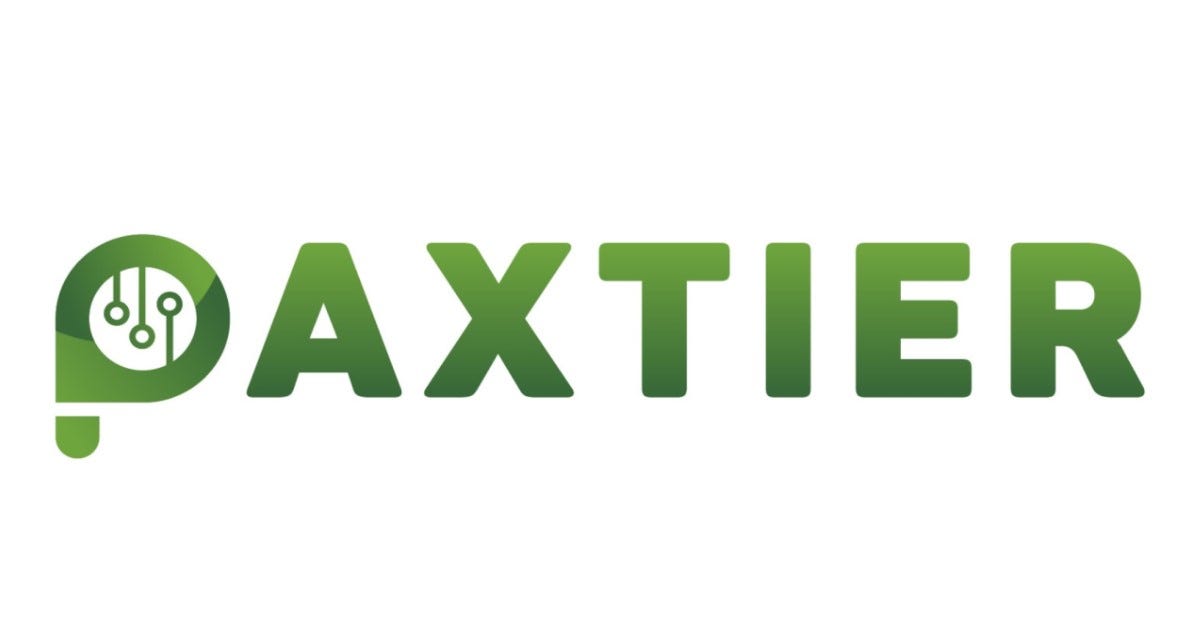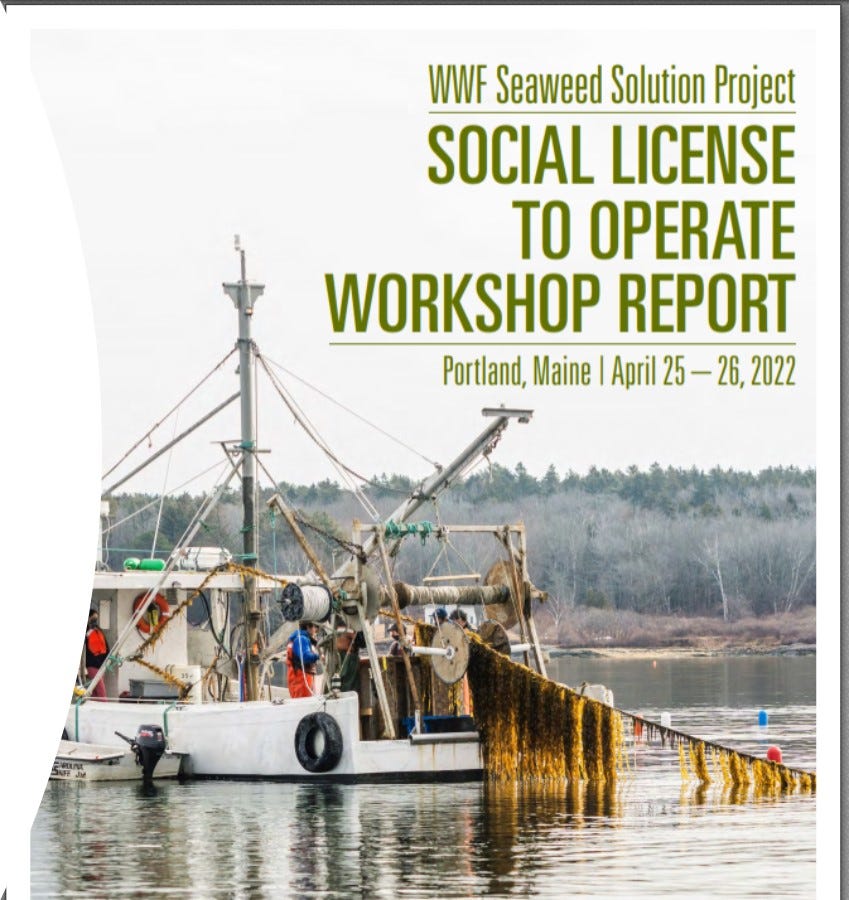🌍 Ecosystem Services and Algae Tech with Professor Charlie Yarish
PLUS: €215.5 million to propel Europe’s circular bio-based economy, and Origin by Ocean receives €7.5 million.
“It’s the suite of ecosystem services that really elevates the idea of cultivation." — Professor Charlie Yarish
Dear algae technologists - hello and welcome to the Paxtier Report!
This week, check out Jo Kelly’s exciting updates from the Australian Seaweed Institute:
In today’s report:
Markets: 💸 €215.5 million to propel Europe’s circular bio-based economy.
Deals: 🤝 Origin by Ocean receives €7.5 million.
Movers and Shakers: 🌱 Ecosystem services and algae tech with Professor Charlie Yarish.
Around the web: 🌍 Why offshore wind is ripe for the UK’s seaweed sector.
Markets and Investing
✂️Algae Market Snippets
Some big moves in recent weeks…
General:
€215.5 million to propel Europe’s circular bio-based economy. (Read more HERE).
Macroalgae:
Bioplastics startup, Kelpy, and SOS Carbon, partner to harvest sargassum and turn it into sustainable plastics. (Read more HERE).
Colruyt Group is collaborating with The Seaweed Company on a soil health project. (Read more HERE).
Origin by Ocean receives €7.5 million in seed capital to detoxify the chemical industry with algae-based solutions. (Read more HERE).
BettaF!sh launches TU-NAH at 280+ Müller stores across Germany, Austria & Spain Read more HERE).
ARPA-E to award up to $5M to investigate extracting rare earth and other critical minerals from macroalgae. (Read more HERE).
Ocean Harvest substantial shareholder sells 1 million shares. (Read more HERE).
Kaly Group pursuing license for kelp farm in Scotland's Loch Bay. (Read more HERE).
SeaTree Emporium has partnered with Groa Garden to create a unique social project in the Vrygrond community. (Read more HERE).
Alga Bio recently raised a $4M seed round. Investors included Collaborative Fund, Y Combinator, Day One Ventures, Cool Climate Collective, Pioneer Fund, and Overview Capital. (Read more HERE).
MACROCARBON SL has just been founded in Las Palmas, on the Canary Islands. It is a spin-off from the Alfred Wegener Institute, Helmholtz Centre for Polar and Marine Research (AWI) and Carbonwave. The start-up is developing algae farms, in which the Sargassum will be cultivated. (Read more HERE).
Microalgae:
The European Parliament and Council negotiators have agreed to increase the uptake of sustainable fuels such as advanced biofuels or hydrogen in the aviation sector. (Read more HERE).
Korean vegan beauty brand Heimish expands US presence with Amazon launch. (Read more HERE).
Harry Butler Institute (HBI) will collaborate with Perth-based Paradigm Fuels to create sustainable biofuel from microalgae. (Read more HERE).
MiAlgae launches algae derived omega-3 product for aqua feed and pet food. (Read more HERE).
Woods Hole Oceanographic Institution licenses algae-based wax tech. (Read more HERE).
Smallfood sets out to transform alt seafood market after discovering wild microalgae strain. (Read more HERE).
Nordic Naturals works with Walmart to expand availability of Omega-3 supplementation (Read more HERE).
Companies implicated in DSM’s infringement lawsuit move to invalidate patents with counterclaim. (Read more HERE).
In depth with Peter Green
🌍 Ecosystem Services and Algae Tech with Professor Charlie Yarish
Professor Charlie Yarish is widely hailed as the grandfather of the commercial seaweed industry in the United States.
Boasting a Masters degree from the University of Texas, a Ph.D. from Rutgers University, 43 years of experience as a faculty member at the University of Connecticut (plus 3 years as a Professor Emeritus), Charlie's expertise in seaweed research and aquaculture has earned him global recognition.
Throughout his distinguished career, Charlie has played a pivotal role in shaping the seaweed industry as we know it today. And in this interview, he shares his thoughts on the evolution of ecosystem services, challenges facing seaweed cultivation, and the role of the Algae Technology Education Consortium.
How have you seen interest in seaweed ecosystem services evolve over the course of your career?
Ecosystem services can be broadly divided into four categories: provisioning services (biomass production), regulating services (e.g. production of oxygen and sequestering of carbon), supporting services (e.g. nutrient cycling), and cultural services. Throughout my career, communicating all of these with the public has been instrumental in providing a social license to cultivate. The breadth of ecosystem services resonates very strongly with people and elevates the concept of farming - especially in Western countries like the US.
Of course, promoting seaweed cultivation and ecosystem services hasn't always been easy. When I first highlighted seaweed aquaculture as a business opportunity in the US in the 1980s, many people were skeptical.
Later, at an EPA meeting in 1992, my suggestion to use seaweed to manage eutrophication was dismissed again by several stakeholders. Nevertheless, the experience pushed me to delve deeper into the needs of coastal managers in the US. This led me to become the science co-chair of the US EPA's Long Island Sound Program for over 17 years, providing me with valuable insight into management considerations and how the concept of ecosystem services resonates with coastal managers and the general public. I'm particularly proud of a paper that I co-authored on the topic titled “Opportunities, challenges and future directions of open-water seaweed aquaculture in the United States”. This paper covers the history of seaweed cultivation in the US and highlights the significant ecosystem services it can provide.
How has adoption of regulating and supporting seaweed ecosystem services varied across different regions?
In the West, conversations surrounding the environmental benefits of seaweed cultivation have greatly influenced public perception and awareness. This has played a significant role in driving demand for seaweed cultivation. There is a strong bottom-up influence on decision making.
In contrast, Asian countries have been more top-down in their approach, with governments being less influenced by public discourse. In these scenarios, it’s been important to approach governments directly to highlight the broader set of beneficial ecosystem services provided by seaweed cultivation. For example, during bilateral discussions with China several years ago, it became clear that poor water quality in degraded coastal areas was becoming an issue. To resolve this, I suggested using IMTA to my colleagues at the Yellow Sea Fisheries Institute (part of the Ministry of Agriculture). Thanks to this discussion, we soon saw simple fish farms in China with low-level shellfish operations evolve into larger IMTA enterprises. This encouraged numerous universities and government institutes in the region to prioritize regulating and supporting ecosystem services.
Ultimately, understanding the success of Asian seaweed cultivation practices and their adoption of different ecosystem services is crucial. By studying their approach, we can ensure that less-developed countries have the knowledge and tools they need to cultivate seaweed in an effective and sustainable manner right from the start.
What obstacles are preventing implementation of more seaweed farms and ecosystem services?
Some key obstacles include:
1. Poor permitting processes.
Navigating complex permitting processes can be challenging, especially in Western countries where wait times for permits can be several years. In the United States alone, each coastal state has its own permitting requirements, making it difficult to keep abreast of the regulatory landscape.
Consistency in permitting requirements across all coastal waters is needed to facilitate adoption. To tackle this challenge, we are now seeing a federal approach to permitting (led by NOAA) that will create consistency across all coastal waters, from Alaska to California, and from Florida to Maine.
2. A lack of clear communication and education.
To promote awareness and understanding, we need more effective communication and education around the benefits of seaweed cultivation and the ecosystem services it provides.
To this end, developing educational resources and fostering partnerships across various sectors is key. The Algae Technology Education Consortium (ATEC is a standing committee of the Algae Foundation), for instance, provides free online resources and curricula in collaboration with community colleges to promote seaweed cultivation and biotechnology. The consortium is dedicated to open-source sharing of information and making resources accessible to individuals and communities globally. Modules offered cover cultivation techniques, downstream processing, ecosystem services and social license.
I’m also actively involved with an organization called GreenWave (https://www.greenwave.org/), which is a global network of regenerative ocean farmers that aims to replicate and scale ocean farms to create jobs and protect the planet. GreenWave is dedicated to providing training and support to over 10,000 farmers by 2030.
Ultimately, social license and public support are crucial to the success of seaweed cultivation initiatives. Today, I’m also a science advisor to the WWF. And one of the initiatives in the US (and Western Europe) is to expand the social license for seaweed and shellfish aquaculture:
What motivated you to collaborate with The Algae Foundation and establish the Algae Technology Education Consortium?
In 2009, I played a role in founding the first kelp company (Ocean Approved) in the United States, now known as Atlantic Sea Farms. When I provided the scientific underpinning of that company, I needed to train graduate students to work with me. Consequently, I developed a suite of resources on the topic of seaweed to bring the students up to speed, and I eventually made this freely available to the public as part of ATEC.
We have since complemented these scientific reports with a series of YouTube videos, recognizing the efficacy of visual aids and their accessibility over the Internet in promoting seaweed cultivation. This approach has garnered widespread attention, and has been particularly helpful for those who prefer a more hands-on approach to learning - including displaced fisherman and other communities of the working waterfront.
If you’d like to learn more about Professor Charlie Yarish, check out his page here: https://eeb.uconn.edu/charles-yarish/), and you can also connect with him on LinkedIn here.
🐦Tweet of the week
🔥 What else was hot in algae tech?
General:
Fibres of future: Scope for Bio-synthetic & Bio-based fibres as an alternative. (Read more HERE).
Macroalgae:
(Paper) Effect of Laminaria digitata dietary inclusion and CAZyme supplementation on blood cells, serum metabolites and hepatic lipids and minerals of weaned piglets. (Read more HERE).
Why offshore wind is ripe for the UK’s seaweed sector. (Read more HERE).
As mariculture in Alaska grows, industry leaders look abroad for inspiration. (Read more HERE).
Beyond the bottom line: Impact investing looks to correct underinvestment in rural America. (Read more HERE).
Researchers in Scotland have received funding to use seaweed in combination with new battery materials to help improve performance of next-generation lithium-ion batteries... (HERE).
Methane blocker developer CH4 Global aiming to achieve gigaton scale impact before 2030: ‘There is enormous market pull’. (Read more HERE).
World’s at-risk kelp forests provide billions of dollars in benefits, study shows. (Read more HERE).
Safe Seaweed Coalition becomes the Global Seaweed Coalition. (Read more HERE).
Microalgae:
(Paper) New insights into raceway cultivation of Euglena gracilis under long-term semi-continuous nitrogen starvation. (Read more HERE).
MIT engineers devise technology to prevent fouling in photobioreactors for CO2 capture. (Read more HERE).
Arctic ice algae heavily contaminated with microplastics, reports new research. (Read more HERE).
Chlorella supplementation may boost cycling performance: RCT. (Read more HERE).
Volcanic microbe eats CO2 ‘astonishingly quickly’, say scientists. (Read more HERE).
That’s all folks!
Thanks again for joining us this week. Hope you have a great day and stay tuned for more algae tech updates soon!
Peter






